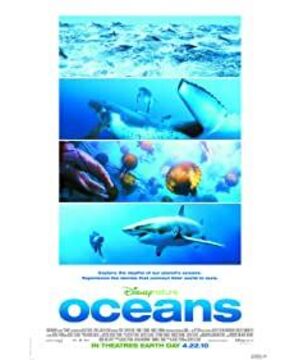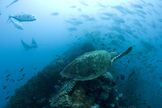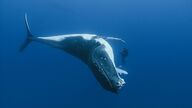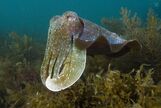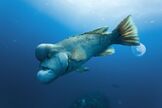The ocean has never been the Garden of Eden. On the one hand, we can see magnificent, quiet, bizarre, or gorgeous scenes; on the other hand, the natural law of the law of the jungle has never failed. We can see groups of dolphins shuttle across the sea, cattle and sheep are also in groups on the grasslands on the bottom of the sea, sea snakes dance freely in the water medium, and different species can coexist with each other. The brutal struggle for survival also exists, from the mass slaughter of turtle hatchlings by albatrosses on the beach, to the shocking battle scenes between crabs. Natural selection, survival of the fittest; the survival and continuation of populations will always be costly. It's just that one primate, the self-proclaimed king of nature, is increasingly obsessed with playing the master role of natural selection.
"On the other side of the distant ocean, human beings have discovered a new world, many unknown species have entered people's field of vision, and a new page in nature has opened." In this documentary, the fleet that opened up new routes appeared on the sea level. It was evening time. In fact, at this moment, can it also be understood as an era in nature that has come to dusk?
Everything that followed was astounding. In the face of human slaughter, all kinds of fish, big and small, struggled desperately, in vain. The blood gushing outwards stained the blue sea water, and corpses were entangled in the fishing nets. The once mighty shark, lost its limbs and tail, slowly sank to the bottom of the sea and disappeared into the darkness. "Polluted river water flows to the sea, and they are like blood, constantly pouring into the sea." A sea lion swims in the sea full of human waste, and the shore is lined with chimneys of chemical factories, constantly bubbling black smoke and flames. The two poles, the last one can barely be called a still land that human beings have not yet set foot on. After all, it will inevitably be affected by climate change. Everything is very fragile and precarious.
"Extinct... Extinct... Extinct..."
The first half of this documentary shows us a magnificent and colorful marine ecological scene, picturesque and picturesque, which can be called a perfect ocean. A symphony; the second half is a harsh reality: pollution, indiscriminate killing, extinction. The ocean is vigorous and fragile, with strong contrasts. In the last scene, the teenager stared at the fish in the glass box of the aquarium through the glass for a long time, and then left silently, leaving the fish that lost their freedom to stay in place.
It is said that after the film was broadcast abroad, the consumption of shark fins has been greatly reduced, which can be regarded as a small achievement. I hope that human conceit, shortsightedness and greed can be restrained, and respect for this piece covering three-quarters of the earth's surface. "Blue Territory". After all, we don't want "the creatures we will see in the future will only exist in the fences of the zoo, and in the tanks of the aquarium."
View more about Oceans reviews


